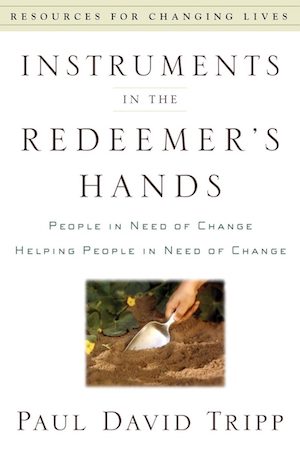It is basically just a call to biblical friendship. It is almost embarrassingly simple: Love people. Know them. Speak truth into their lives. Help them do what God has called them to do.
So writes Paul David Tripp, on pages 274-275 of his 2002 book, Instruments in the Redeemer’s Hands: People in Need of Change Helping People in Need of Change.
The basic premise of the book is that God brings about change in our lives by means of relationships. This follows the principle of incarnation:
God has called us to nothing less than incarnating Christ to others. … You and I are called to put flesh and blood on who Christ is and what he came to do (97).
This is the calling of all believers. Tripp’s term for it is ‘personal ministry’:
The times of formal, public ministry are meant to train God’s people for the personal ministry that is the lifestyle of the body of Christ (20, emphasis added, cf. Ephesians 4:11-16).
Another central conviction behind the book is that change takes place in the heart. ‘The heart is the “real” you’ (59). It is the root of the plant, the fruit of which is our behaviour (60-63). The heart is the seat of desire and worship. It will either be ruled by God, or by idols. Change comes about as we identify our misdirected worship, and as God ‘recaptures’ our hearts (65-71, cf. Ezekiel 14:1-5).
The four stages of Tripp’s pastoral message keep the heart as the focus:
- Love. Build a relationship of trust with the other person.
- Know. Gather information to help the other person to identify the problem in the heart.
- Speak. Help the other person to recognise the problem, by careful application of Scripture.
- Do. Help the other person to identify the changes needed, and to put those changes into practice.
A key part of this method is the use of homework. Typically, this takes the form of some kind of journal. For example, if the person is in a difficult relationship, they would keep a journal of (1) what happened, (2) what they did in response, (3) what they thought about what happened, and (4) what motivated their response (189-194, cf. 224-227).
The book places great emphasis near the start (and on the back cover) on its relevance for all Christians, and not just for professional counsellors. But, as the book progresses, it becomes clear that the book is aimed squarely at the latter. However, much of the material in the book could be put into practice in more informal contexts. Indeed, much of the wisdom about keeping a journal could even be used by a person on their own.
(I wonder whether there is a British/American difference here? Is counselling more widely practised in the USA than in the UK? Do American pastors typically see ongoing counselling as a significant part of their ministry, while British pastors would tend to direct people to someone else for such counselling?)
There are many examples of particular situations scattered through the book, demonstrating how the method works in real life. A useful complement to the book would be something that works through these common human problems in a systematic way.
